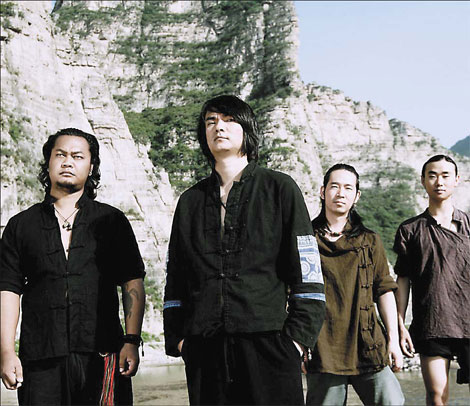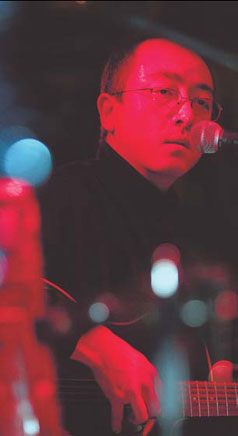Life and Leisure
Original sounds
By Chen Nan (China Daily)
Updated: 2010-09-14 08:03
 |
Large Medium Small |
|
Mountain People is known for its music inspired by the Va and Bouyei ethnic groups of Yunnan and Guizhou provinces. Provided to China Daily |
A festival of ethnic music hopes to showcase a genre that is quintessentially Chinese. Chen Nan reports
Although music is no longer lucrative business on the Chinese mainland, with piracy and free Internet downloads cutting into record sales, live music - especially in the form of outdoor music festivals - continues to thrive. The explosion of live music - with 40 festivals being held across the country this year - has brought rock 'n' roll back in the spotlight, with hundreds of local bands taking to the stage at the main music festivals.
However, what is even more encouraging, says music mogul Zorro Xu Xiaofeng, is the folk music emerging out of ethnic groups.
The nation's first Hanggai Music Festival, which will be held on Sept 18 in Shunyi district, on the northeastern outskirts of the capital, will gather seven bands, whose music is rooted in their ethnic origins. Xu believes these musicians are the real treasure of Chinese music and the ones who can make themselves heard on the world stage.
"It's not a big festival, compared to those that have hundreds of bands performing over three or four days, but we really believe less is more and want to give audiences time to savor each performance," says Xu, of the Hanggai festival, a one-day affair featuring just seven bands.
Xu says the idea of the festival came from the Hanggai band, a folk music group that specializes in combining Mongolian folk music with modern styles.
|
Zhang Weiwei will perform classic folk songs from Northwest China at the first Hanggai Music Festival. Xie Yu / for China Daily |
The band, whose members are mostly from Inner Mongolia autonomous region, has acquired an international following in recent years thanks to their unique music, accompanied by traditional Mongolian instruments and defined by khoomei, a 2,000-year-old Mongolian throat singing technique.
Xu has roped in six other folk-music groups for the festival, billed as the country's first world music festival.
Among them is Wild Children, a 15-year-old band from Northwest China, whose founder Zhang Quan returns to the stage with his trademark high-pitched notes after a 10-year gap.
The music of Mamer and his IZ Band, from Qitai county of Xinjiang Uygur autonomous region, is inspired by Kazak folk music. Traditional instruments are their specialty, and include a variety of guitars, bouzouki (a long-necked lute), harp and the two-stringed dombra lute.
Mountain People, from Yunnan and Guizhou provinces, present the music of the Va and Bouyei ethnic groups.
"We have performed at some domestic music festivals and what we saw there was usually chaos, with crazy tattooed fans off the main stage waving to the beats of rock music, while a small, interested group strained their ears near a folk music stage," says Zhang Weiwei, an established folk musician who is best known for his accordion accompaniment in the band, Wild Children.
"Neither the listeners nor the performers can concentrate, with sounds from the different stages cutting into one another," Zhang says.
He will perform classic folk songs from the Yellow River region, Northwest China, with his friend Guo Long at the Hanggai Music Festival.
"I prefer small music festivals, which specialize in one musical genre. The Hanggai festival offers a good opportunity to showcase authentic Chinese music," Zhang says.
Apart from bands from ethnic groups, Xu has also invited artists with a distinctive musical style, such as Nancheng Erge, who specializes in the Beijing fusion of xiangsheng (comic cross-talk) and folk music; and Song Yuzhe, a self-taught singer whose music is that of nomadic people across the country.
"China's diverse culture offers virtually unlimited possibilities in music writing and instrument playing," Xu says. "For people who really want to know Chinese music, these musicians are the ones to listen to."
Xu worked for Warner Music China for nearly 10 years, before quitting in 2005. He has overseen the Chinese music industry for years and has been trying to understand why Chinese musicians are not able to make their voices known internationally.

"The atmosphere at music festivals can be intense and one can feel the raw energy of the fans. But why aren't the performers remembered and why aren't they able to make an impact abroad?" he wonders.
In 2008, Xu founded the Chinese Music Industry Base to promote Chinese independent music, particularly folk singers.
He has also gathered three distinctive rock bands - the heavy metal band, Miserable Faith, alternative rock band, Second Hand Roses, and blind folk singer Zhou Yunshan - to promote their music under a project he calls the "Three Kingdoms of Rock 'n' Roll".
The three bands have toured nationally since 2008 and won many fans.
According to Xu, in the past decade, only a few Chinese musicians, such as Dadawa, Sa Dingding, and the all-female group, Twelve Girls Band, have been able to make an impact abroad.

"While the West, followed by Japan and South Korea, takes the lead in pop music, the main trend in the pop music scene here is imitation. The same is true of rock 'n' roll. You can hear a similar drum beat, be it a band from Beijing or New York," Xu says.
"But the music of groups such as the Hanggai band are original and Chinese.
"I believe such Chinese bands will take off and fly high someday."

